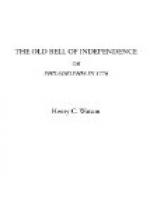STORY OF THE PRAYER.
“There is only one other scene during the struggle for our country’s right,” said young Harmar, “which I would compare with the one I have just narrated; and that is the scene in Congress—the old Continental Congress—during the first prayer by the Rev. Mr. Duche.”
“I’ve heard something of that prayer,” said Morton, “since the Revolution, but nothing that I could depend on.”
“An account of the scene is given by John Adams, who was a chief actor in it,” said young Harmar.
“Old John Adams?” enquired Higgins. “He was the man! He was the Washington of our politics during the war. He was the man!” and Higgins rubbed his hands together.
“Thomas Jefferson, take your foot off your brother’s, and quit pinching him,” interrupted Mrs. Harmar.
“I have Mr. Adams’ account of that first prayer and its effects,” said young Harmar, “and here it is.” So saying, he pulled from his pocket a paper into which the account had been copied, and read:—
“’When the Congress met, Mr. Gushing made a motion that it should be opened with prayer. It was opposed by Mr. Jay, of New York, and Mr. Rutledge, of South Carolina, because we were so divided in our religious sentiments, some Episcopalians, some Quakers, some Anabaptists, some Presbyterians, and some Congregationalists, that we could not join in the same act of worship. Mr. Samuel Adams arose and said, ’that he was no bigot, and could hear a prayer from any gentleman of piety, and who was, at the same time, a friend of his country. He was a stranger in Philadelphia, but had heard that Mr. Duche (Dushay they pronounced it) deserved that character, and therefore he moved that Mr. Duche, an Episcopal clergyman, might be desired to read prayers to the Congress to-morrow morning.’ The motion was seconded, and passed in the affirmative.—Mr.




